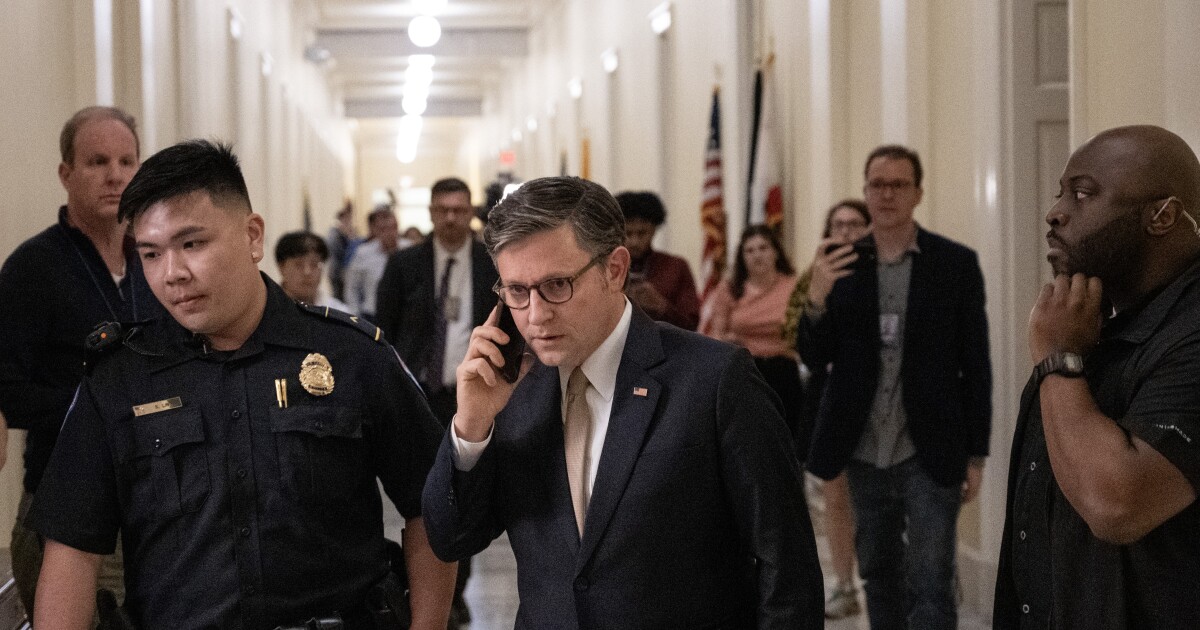A key House committee advanced President Donald Trump’s giant tax and spending package after Republican hardliners won agreement from party leaders to speed up cuts to Medicaid health coverage.
The vote in the House Budget Committee paves the way for passage of the legislation as soon as Thursday, House Republican leadership aides said Monday.
The late Sunday night committee vote followed a weekend of negotiations with four ultraconservatives on the panel who on Friday joined with Democrats to reject the legislation. Those hardliners instead abstained on Sunday and voted present, allowing the bill to advance.
Representative Chip Roy of Texas, one of the four hardliners, said party leaders agreed to move up Medicaid work requirements expected to kick millions of beneficiaries off the health coverage program and more quickly phase out clean energy tax breaks.
But Roy still expressed dissatisfaction, saying the measure “does not yet meet the moment.” Roy and the House Freedom Caucus said in posts on X they are hoping to win additional cuts before the bill comes up for a vote on the House floor.
Budget Committee Chairman Jodey Arrington said he didn’t know what changes the party leaders had agreed to make. The changes will be added later, before the legislation is voted on by the full House.
House Speaker Mike Johnson told reporters “there’s a lot more work to do” on the tax bill but said he would push on Medicaid work requirements “to make it happen sooner, as soon as possible.”
On Monday, House Majority Leader Steve Scalise told CNBC that work requirements would start in 2027, two years earlier than the timeframe in the draft legislation. But the Republican leadership staff later said that the date has not yet been settled.
Republicans broadly agree about imposing work requirements on Medicaid, the leadership aides told reporters. The discussion is around the start date, the people said. Republicans are also continuing to discuss the cap on the state and local tax deduction and when clean energy credits will phase out, they said.
There is strong support among Republicans for the tax cuts at the core of the package, providing an impetus to work out political differences.
But the House panel’s initial rejection of the legislation and the two-day impasse was an embarrassing setback for Republican leaders on their top legislative priority, highlighting ferocious infighting among party factions over components of the sprawling multi-trillion dollar fiscal package.
Trump fulminated against the ultraconservatives on social media Friday after they blocked the legislation, accusing them of “grandstanding” demands.
“It’s essential that every Republican in the House and the Senate unites behind President Trump and passes this popular and essential legislative package,” White House Press Secretary Karoline Leavitt told reporters Monday morning.
She added that Trump plans to be “very engaged” as the bill moves through Congress and will likely call members directly if they are waffling on their support for the bill.
More turbulence may lay ahead as the legislation proceeds toward a vote by the full House and then consideration in the Senate, where the deeper Medicaid cuts the hardliners demanded as well as other provisions face scrutiny, if not outright opposition.
Republicans from high-tax states such as New York, New Jersey and California have threatened to defeat the legislation unless they get a higher limit on the federal income tax deduction for state and local taxes.
Deficit worries and long-term interest rates approaching 5% have enhanced a campaign by the party’s right flank to seek deeper cuts to government spending. Those concerns were highlighted on Friday evening when Moody’s lowered the U.S. credit rating to Aa1 from Aaa.
If the House does pass a version of their bill, more obstacles await in the Senate.
Senator Josh Hawley, a Missouri Republican, has said he would not vote for the House measure’s cuts to Medicaid benefits and points to cutting prescription drug prices as a better way to gain savings.
The bill’s Medicaid cuts could also face skepticism from moderate Republicans, including Susan Collins of Maine and Lisa Murkowski of Alaska — who helped defeat Trump’s effort to repeal the Affordable Care Act in 2017.
Still other senators, including Thom Tillis of North Carolina, whose state has billions in green energy projects already built or in the works, want a more gradual phase-out of Biden administration clean-energy tax incentives.
As initially unveiled by House Republicans, many clean energy credits would begin to phase out in 2029.
The tax breaks, which include incentives for wind and solar power, nuclear power and other sources of clean energy, have been ripe targets for lawmakers looking to offset the cost of extending Trump’s cuts.
Others, like the tax credit for electric vehicles, would in most cases phase out starting at the end of 2025.


 Accounting1 week ago
Accounting1 week ago
 Finance1 week ago
Finance1 week ago
 Economics6 days ago
Economics6 days ago
 Economics7 days ago
Economics7 days ago
 Finance1 week ago
Finance1 week ago
 Economics1 week ago
Economics1 week ago
 Personal Finance5 days ago
Personal Finance5 days ago
 Economics4 days ago
Economics4 days ago











